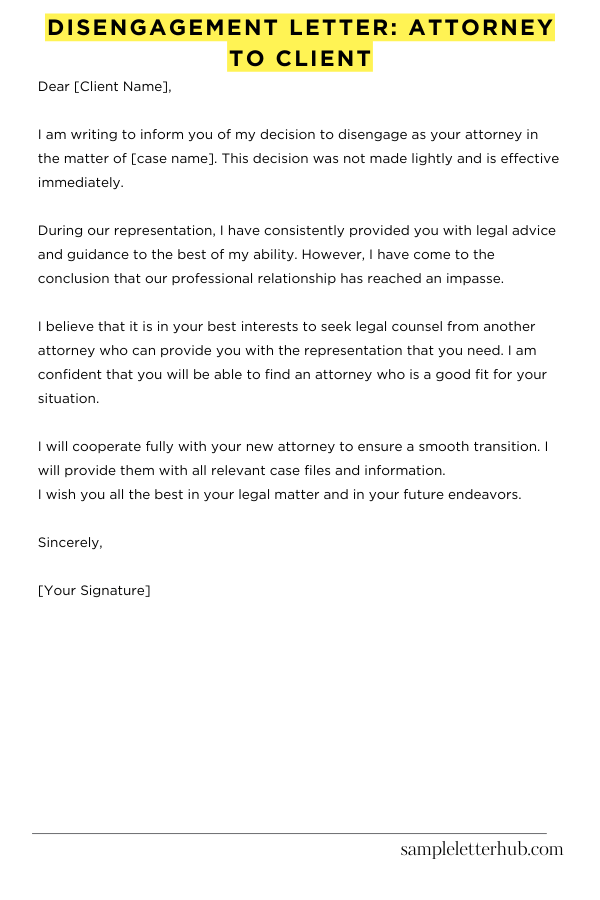A disengagement letter is a formal document that an attorney sends to a client to end their professional relationship. It outlines the reasons for the disengagement, the effective date of the termination, and any outstanding obligations or fees.
In this article, we will provide you with templates, examples, and samples of disengagement letters that you can use to draft your own letter. These templates are designed to make the process of writing a disengagement letter as easy as possible.
Whether you are an attorney looking to end a professional relationship with a client or a client who needs to disengage from an attorney, these templates will provide you with the necessary guidance and support.
Disengagement Letter: Attorney to Client
Dear [Client Name],
I am writing to inform you of my decision to disengage as your attorney in the matter of [case name]. This decision was not made lightly and is effective immediately.
During our representation, I have consistently provided you with legal advice and guidance to the best of my ability. However, I have come to the conclusion that our professional relationship has reached an impasse.
I believe that it is in your best interests to seek legal counsel from another attorney who can provide you with the representation that you need. I am confident that you will be able to find an attorney who is a good fit for your situation.
I will cooperate fully with your new attorney to ensure a smooth transition. I will provide them with all relevant case files and information.
I wish you all the best in your legal matter and in your future endeavors.
Sincerely,
[Your Signature]

How to Write a Disengagement Letter: Attorney to Client
Introduction
A disengagement letter is a formal document that an attorney sends to a client to terminate their legal representation. This letter is typically used when the attorney and client have irreconcilable differences, or when the attorney believes that they can no longer effectively represent the client.
Content
The content of a disengagement letter will vary depending on the specific circumstances of the case. However, there are some general elements that should be included in every letter.
- A statement that the attorney is withdrawing from representation
- The reason for the withdrawal
- The date on which the withdrawal will be effective
- Instructions for the client on how to obtain their case file
- A request for the client to sign and return a copy of the letter
Tone
The tone of a disengagement letter should be professional and respectful. The attorney should avoid making any personal attacks on the client, and should focus on the facts of the case.
Format
A disengagement letter should be typed on letterhead and signed by the attorney. It should be mailed to the client via certified mail, return receipt requested.
Sample Letter
The following is a sample disengagement letter:
[Your Name]
[Your Address]
[Your Phone Number]
[Your Email Address]
[Date][Client Name]
[Client Address]
[Client Phone Number]
[Client Email Address]Re: Withdrawal of Representation
Dear Mr./Ms. [Client Name],
Please be advised that I am hereby withdrawing as your attorney in the matter of [case name]. This decision has not been made lightly, and I have given it careful consideration.
The reason for my withdrawal is that I believe that I can no longer effectively represent you in this matter. I have come to this conclusion after careful consideration of all of the facts and circumstances of the case.
My withdrawal will be effective on [date]. I will continue to work on your case until that date, and I will do everything in my power to ensure a smooth transition to new counsel.
I have enclosed a copy of your case file for your records. Please sign and return the enclosed copy of this letter to acknowledge receipt of your file.
Thank you for your understanding.
Sincerely,
[Your Name]
Conclusion
Writing a disengagement letter is a difficult task, but it is important to do it in a professional and respectful manner. By following the tips in this article, you can ensure that your letter is clear, concise, and effective.
FAQs about Disengagement Letter Attorney To Client
What is a disengagement letter?
A disengagement letter is a formal document that an attorney sends to a client to terminate the attorney-client relationship. It outlines the reasons for the termination, the effective date, and any outstanding fees or obligations.
When should an attorney send a disengagement letter?
An attorney should send a disengagement letter when they can no longer represent a client due to a conflict of interest, ethical concerns, or other reasons. It is important to send the letter promptly to avoid any confusion or misunderstandings.
What should be included in a disengagement letter?
A disengagement letter should include the following information:
- The date
- The names of the attorney and the client
- The reason for the termination
- The effective date of the termination
- Any outstanding fees or obligations
- Instructions for returning any client files or property
What are the consequences of sending a disengagement letter?
Sending a disengagement letter terminates the attorney-client relationship. This means that the attorney is no longer obligated to represent the client and the client is no longer obligated to pay the attorney’s fees. The client is free to seek legal representation from another attorney.
What should a client do if they receive a disengagement letter?
If a client receives a disengagement letter, they should review it carefully and contact the attorney to discuss any questions or concerns. The client should also begin the process of finding a new attorney.

